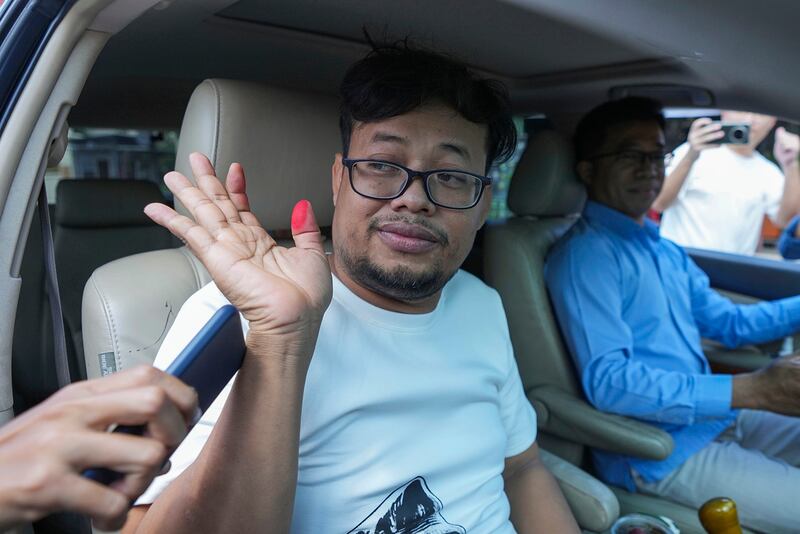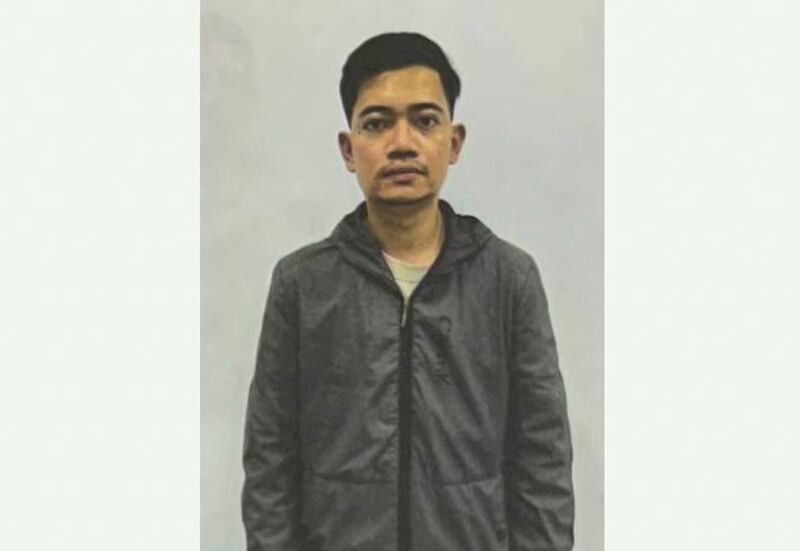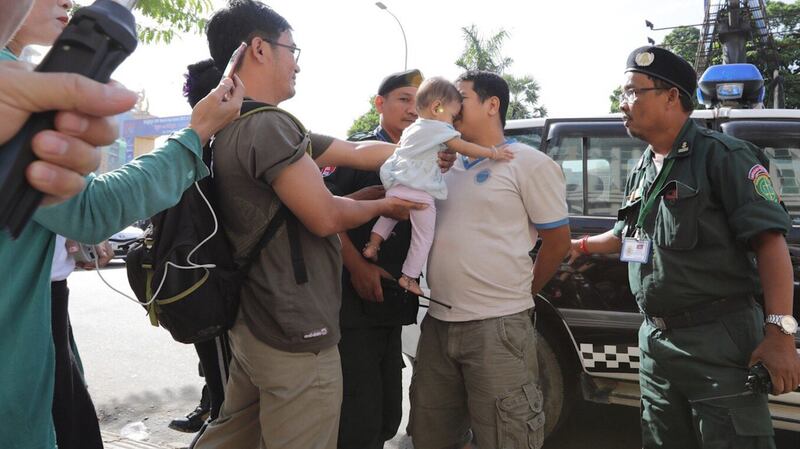The videos posted to Facebook all have the same look and feel: The subject looks directly at the camera, joins his hands in a sampeah – a Cambodian gesture of respect – and apologizes.
Examples from last month – Cambodian journalist Mech Dara and overseas activist Hay Vanna – were just the latest additions to a long list of activists and critics forced by threats or legal action to recant and pledge their loyalty to the ruling Cambodian People’s Party, or CPP.
In the months before the July 2023 general election, close to a dozen top opposition party officials switched their allegiance to the ruling party.

One of the more notable defections from that time period was that of prominent and outspoken opposition youth activist Yim Sinorn, who stood next to then-Prime Minister Hun Sen with a tight smile on his face for a photo posted to Facebook.
“It is my duty to be committed to protect peace and prevent any attempts to destroy the country,” Yim Sinorn wrote on his wife’s Facebook page. “I have little education and experience but I want to serve the country and her people.”
“If Samdech gives me a chance I would like to join the CPP to be able to serve the people and the country,” he wrote, using an honorific title for Hun Sen.
Yim Sinorn had been a close ally of Kem Sokha, the leader of the now-banned Cambodian National Rescue Party who was sentenced to 27 years for treason last year in a decision widely condemned as politically motivated.
Yim Sinorn was arrested after posting a comment on Facebook that seemed to highlight the political powerlessness of King Norodom Sihamoni, who is required by Cambodia’s 1993 Constitution to reign as a national figurehead.
A week later, wearing an orange jumpsuit, he apologized from prison for the Facebook comment in a video that was uploaded to the social media site. He met with Hun Sen soon after his release.
Mech Dara’s case
Last month, Mech Dara – a reporter known for his hard-hitting reporting on cyber-scam compounds and human trafficking – posted a similar video while also wearing an orange jumpsuit.
Incitement charges against Dara were based on several social media posts. The charges drew significant criticism from human rights groups and foreign governments.

Meanwhile, Hay Vanna’s two-minute video was posted on Facebook from Japan, where he has organized protests among overseas Cambodian workers, after the arrest of his brother.
The demonstrations “caused chaos” and were “provoked by extremists,” such as exiled opposition leader Sam Rainsy, Hay Vanna said in the video.
“I declare that I am parting from Sam Rainsy,” he said. “I want to use my knowledge that I have to serve the country and I ask Samdech [Hun Sen] to forgive me so I can join the CPP.”
After Hay Vanna’s video was posted Phnom Penh Municipal Court Judge Yi Sokvouch signed a warrant ordering the release of the brother from Phnom Penh’s Prey Sar prison, pending his upcoming trial.
Those are some of the most high-profile instances. Several other opposition activists told Radio Free Asia that they were forced to pledge allegiance to the ruling party to maintain the safety of their family or to avoid politically motivated criminal charges.

Since Hun Sen’s son, Hun Manet, became prime minister in August 2023, more than 10 officials from the opposition Candlelight Party have received written threats that urged them to switch to the CPP, according to Kong Chi, the party’s former deputy chairman for Sihanoukville.
“All the defections have been by coercion,” he said from Japan. “I received all kinds of intimidation against me.”
Personal safety and freedom
Opposition activist Kong Raiya switched to the CPP after meeting with Hun Sen in 2023. He was given a job at the Ministry of Education that came with a government salary big enough that he could buy a car.
But eventually he resigned from the ruling party and crossed over the border to Thailand.
“I cannot force myself to do work that I do not enjoy,” he said. “The most important goal for me was to maintain my own safety. I joined the CPP, but not to serve the interests of the CPP.”

Former opposition party activist Voeun Veasna said that his apology to Hun Sen was also only motivated by personal safety and to maintain his freedom.
“To my experience, those political, land and forest activists who apologized and defected to the ruling party in the past, they didn’t sincerely apologize,” he said. “They were forced and threatened.”
Voeung Samnang, an activist for the now-banned Cambodia National Rescue Party, refused to apologize or renounce his ties to the opposition. He has been held in Prey Sar prison in Phnom Penh for three years, his wife, Teang Chenda, told RFA.
“My husband loves democracy and wants freedom without apology or submission,” she said.
CPP spokesman Sok Eysan told RFA that the ruling party has accepted new members from the opposition in the past out of mutual understanding.
He warned that “those who confessed and joined the ruling party and then turned their backs against the government are dishonest,” and could face further legal action.
In mid-2023, Hun Sen issued a similar warning to opposition party officials who surrendered to the ruling party. If they dared to betray the CPP, their previous convictions would be reinstated, he said.
Translated by Yun Samean. Edited by Matt Reed and Malcolm Foster.
